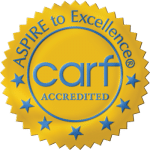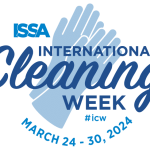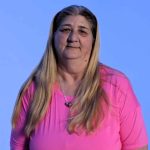World Autism Month – Advocacy and Empowerment with Dawn Itzkowitz
Happy World Autism Month!
As we near the end of this significant month dedicated to recognizing and supporting individuals on the autism spectrum, we had the privilege of sitting down with Dawn Itzkowitz – a passionate advocate for neurodivergent individuals, with a specific focus on autism. Dawn’s journey as both a dedicated advocate and a devoted mother of two sons, one of whom is on the autism spectrum, has provided her with a unique perspective into the challenges and triumphs of advocating for autism awareness and support.
Q: Could you share a bit about your journey as the mother of a son on the autism spectrum? What were some of the early challenges you faced, and how have they evolved as he’s entered early adulthood?
A: Our son, Bryce, was diagnosed with Autism in 2004 when he was two years old. At that time, there wasn’t much awareness about autism, so one of the challenges we faced was the lack of understanding. However, finding early intervention services wasn’t a struggle for us initially. It was only after moving from state to state and becoming involved in the autism community that we realized how challenging it could be for others to access these vital resources. Fortunately, in Fort Myers, Florida, we were able to access early intervention, which made a significant difference. Before starting early intervention, Bryce wasn’t talking.

However, once we began the program in our home, he started communicating. When he turned three, he transitioned into a specialized class for Autism within the Florida public school system, which played a crucial role in his development. Fast forward to when we moved to Arkansas; we discovered that finding similar services was challenging. Nevertheless, because Bryce had prior early intervention, he seamlessly transitioned into the school system there.
We consider ourselves fortunate to have had access to these services. It’s worth noting that there isn’t a national directory for locating such resources. Connecting with other parents of children on the autism spectrum proved to be invaluable. Throughout Bryce’s schooling, active involvement in his Individualized Education Program (IEP) meetings was crucial. We worked collaboratively with the school to ensure his needs were met. Volunteering at the school, and joining the PTA allowed me to stay engaged, through elementary and middle school. Additionally, we prioritized Bryce’s participation in extracurricular activities, such as the Miracle League and Community Connections, as well as arts programs, to ensure he had a well-rounded experience. As Bryce entered high school, we began planning for his transition into adulthood, discussing his preferences regarding employment and further education. This coincided with our move from Arkansas to Palm Beach, Florida, where Bryce had to adjust to a new school environment. Fortunately, the support from the staff and our new IEP team was exceptional. We discovered that Bryce could complete all his schoolwork without modifications, albeit needing some extra time.
Ultimately, Bryce graduated with a full diploma and engaged in vocational rehabilitation. For us, it’s been about navigating each stage of Bryce’s journey and adapting to his evolving needs. Now, as we approach adulthood, we’re continuing to support him as he charts his path forward.
Q: At some point, you stepped out of just your regular “mom role” and began advocating for the neurodivergent community. What inspired that pivot?
A: The pivot into advocacy began during our time in Southwest Florida when we started participating in autism awareness walks. Over two years, we actively participated and raised significant funds for the organization. Eventually, they approached both my husband Brian and me, inviting us to become more involved in the community. Given Brian’s responsibilities with the Southwest Florida Goodwill, his time was limited. So, I took on a more active role and began assisting with organizing events. This initial involvement led to further engagement when the organization merged with Autism Speaks. As a
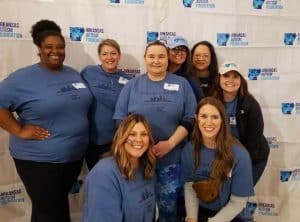
mother, this volunteer work provided me with a sense of purpose and fulfillment, knowing I was making a meaningful contribution to the community. Volunteering within the community has been incredibly rewarding and impactful for me. This journey of advocacy continued to evolve as our family relocated to different states. When we moved to Arkansas, our group of local advocates recognized the need for more targeted support within our community. We founded the Arkansas Autism Foundation to ensure that the funds we raised stayed within Arkansas, making a tangible difference in the lives of Individuals with Autism in our state. Then, when we moved to Palm City, Florida, I joined the board of the Hope Center for Autism, a charter school for individuals with autism. Additionally, I became involved with their teen and young adult program called Next Step, which provided a supportive environment for individuals to socialize and engage in typical activities. Continuing my commitment to advocacy, I currently serve on the boards of both the Arkansas Autism Foundation and the Hope Center for Autism. Now, in South Carolina, I’ve embarked on a new volunteering endeavor with SOS Care, an organization dedicated to creating affordable housing for individuals with autism and intellectual disabilities. Their recent opening of a housing community in Conway showcases the importance of providing inclusive and supportive living environments for neurodivergent individuals. It’s an honor to be part of initiatives that promote inclusion, acceptance, and empowerment within our communities.
Q: What are some misunderstandings people have about individuals with autism?
A: One common misconception is the failure to recognize that autism encompasses a spectrum of disorders. This means that individuals with autism spectrum disorder vary greatly in their abilities and challenges. For instance, some may be fully capable of holding a job and participating in social activities, yet others may struggle with communication and social interaction, such as avoiding eye contact. It’s important for people to understand that these differences do not make individuals with autism any less capable or deserving of respect. Another misunderstanding is when individuals with autism exhibit behavioral issues, they are often unfairly labeled as “bad” or “bratty.” In reality, these behaviors are often a result of sensory issues or difficulties in processing their environment. It’s crucial for society to refrain from judgment and instead seek to understand and support individuals with autism during these challenging moments. Additionally, there are cultural stigmas surrounding autism in certain communities, which can further perpetuate misunderstandings and barriers to acceptance. Therefore, it’s essential to prioritize outreach and education within these communities to foster greater understanding and inclusion for individuals with autism.
Q: Palmetto Goodwill proudly serves individuals with disabilities, notably through programs like our partnership with AbilityOne. Why do you believe these programs are important, and how do they contribute to supporting neurodivergent individuals within the community?
A: These programs play a crucial role in empowering individuals with disabilities, including those who have ASD (autism spectrum disorder), by providing them with opportunities for competitive employment. They offer vital support structures, such as job coaching and soft skills training, which are essential for their success in the workplace. Importantly, these programs fill a significant gap in the employment landscape, as there are limited options and opportunities for individuals with disabilities to secure meaningful employment. By fostering inclusive environments and offering supportive services, these programs not only benefit the individuals involved but also enrich the community as a whole. Seeing neurodivergent individuals actively contributing to the workforce helps break down stereotypes and promotes greater acceptance and understanding within society. It demonstrates the value and capabilities of all individuals, regardless of their differences, and highlights the importance of diversity and inclusion in the workplace.
Q: Can you talk a little more about the importance of workplaces and organizations like Palmetto Goodwill creating more inclusive environments for neurodiverse individuals, both as employees and customers?
A: Absolutely. The significance of fostering inclusive environments cannot be overstated. When workplaces like Palmetto Goodwill prioritize inclusivity, it sends a powerful message of acceptance and understanding. By employing neurodiverse individuals, organizations not only provide valuable opportunities for personal and professional growth but also serve as advocates for diversity in the workforce. Moreover, having neurodiverse individuals as employees demonstrates to customers that the organization values diversity and is committed to creating an inclusive environment. It challenges misconceptions and stereotypes, showing that individuals with disabilities are fully capable and contribute meaningfully to the workplace. From a customer perspective, encountering neurodiverse individuals in a business setting promotes empathy and understanding. It helps break down barriers and fosters a sense of community and belonging for everyone. Ultimately, creating inclusive environments benefits both employees and customers, enriching the workplace culture and strengthening connections within the community.
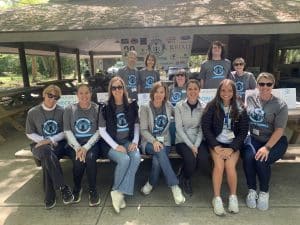
Q: In your experience, what are some effective ways individuals within our community can support and include neurodivergent members?
A: Understanding, acceptance, and inclusion are paramount in creating supportive environments for neurodivergent individuals. Additionally, businesses play a crucial role in promoting inclusivity by opening their doors to hiring members of the neurodiverse community. Currently, only 16% of people with ASD are employed in the United States, a statistic that underscores the need for increased opportunities and awareness. It’s alarming to consider the implications of such a low employment rate, highlighting the importance of concerted efforts to address this issue.
Q: What are some things that you wish you knew earlier about autism in your family’s journey?
A: I feel fortunate that our family’s journey with autism has unfolded relatively smoothly. However, reflecting on the broader autism community, there are certain aspects I wish I had known earlier. One critical aspect is the importance of early intervention and accessing support services promptly. For families navigating the complexities of autism, applying for programs like the Home and Community-Based Waiver Program can be crucial. Understanding the significance of these services and applying for them early can make a substantial difference in accessing the necessary support for individuals with autism. In South Carolina, for instance, there’s a staggering waiting list with thousands of people waiting for funds, and the wait time can stretch from 7 to 15 years. Recognizing the urgency and taking proactive steps to secure support services early on can significantly impact the trajectory of a family’s journey with autism.
Q: As a parent, navigating the transition from childhood to adulthood with Bryce, what resources and support systems have you found most helpful for both him and you?
A: For Bryce, one of the most beneficial resources has been the vocational rehabilitation system. This provided him with opportunities for job training, which he began while still in high school. In South Carolina, he participated in Project SEARCH, a year-long program integrated into the school system that focuses on teaching essential job skills. Through this program, Bryce not only gained valuable skills but also secured employment, marking a significant milestone in his transition to adulthood. However, as Bryce graduated from vocational rehabilitation, we faced new challenges, particularly in finding employment opportunities. This transition can be daunting, but I’m grateful for the supportive community I’ve found through my volunteer roles. Connecting with others who are navigating similar journeys has been invaluable, providing both practical advice and emotional support during this transitional period. It’s about sharing experiences and knowing that we’re not alone in this journey.
Q: What additional information or facts might be helpful for people to know?
A: One significant aspect to consider is the increasing prevalence of ASD in the United States. Currently, the statistic stands at one in 36 children being diagnosed with autism, a substantial increase compared to when my son Bryce was diagnosed, where it was one in 125 children. This rise in prevalence underscores the growing importance of understanding and addressing the needs of individuals on the autism spectrum. It’s important for people to recognize that this increase in diagnoses may be attributed, in part, to better awareness and improved diagnostic practices. However, it also signifies that there are indeed more individuals being diagnosed with autism, highlighting the ongoing need for support and resources within our communities. Another crucial point to emphasize is that autism is a lifelong condition; individuals do not “grow out of” autism. This underscores the importance of providing ongoing support and accommodations to individuals on the autism spectrum throughout their lives, ensuring that they have the necessary tools and opportunities to thrive.
Q: What are your favorite go-to resources you utilize, and who are some people in this domain that you follow or listen to?
A: Temple Grandin is one of my absolute favorites. I find her books incredibly insightful and inspiring. Her unique perspective and quirky personality resonate deeply with me. Having had the opportunity to meet her in person, I’ve found her talks about her life and experiences to be truly inspirational. Temple emphasizes the importance of pushing individuals with autism out of their comfort zones and encouraging them to explore new opportunities, which I find incredibly motivating. Additionally, I’ve found Facebook to be an invaluable resource. I actively join Facebook groups related to autism wherever we live, and I’m always amazed by the wealth of information and support available within these communities. It’s a platform where I can easily connect with other parents and individuals within the autism community, share experiences, and seek advice when needed. The ability to post questions and engage in discussions has been immensely helpful in navigating various aspects of our journey with autism.
Q: Looking forward, what are your hopes and aspirations for the future of autism advocacy and support, both locally and globally?
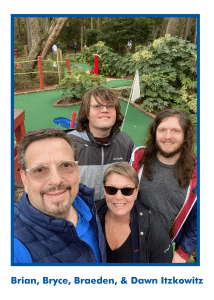
A: My vision for the future of autism advocacy and support revolves around two key pillars: awareness and acceptance. While inclusion is crucial, it all begins with raising awareness and fostering acceptance within our communities. I envision a future where individuals with ASD are not only recognized but fully embraced for their unique strengths and abilities. One of my primary aspirations is to see a significant increase in employment opportunities for individuals with ASD. It’s disheartening to know that only 16% of people on the spectrum are currently employed. I believe that by promoting understanding and offering tailored support in the workplace, we can create more inclusive and diverse work environments where neurodiverse individuals thrive. Another important aspect is the provision of affordable housing solutions. Many individuals with ASD continue to reside with their parents, who often become their primary
caregivers. While familial support is invaluable, it’s essential that individuals with ASD have the opportunity to live independently within their communities, surrounded by their peers. Accessible and affordable housing options would enable them to lead fulfilling lives and contribute meaningfully to society. Overall, my hope is for a future where individuals with ASD are fully integrated into every aspect of society, where their voices are heard, and their potential is realized. Through continued advocacy, education, and collaborative efforts, I believe we can create a world that celebrates and supports neurodiversity in all its forms.



